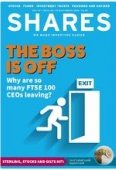Archived article
Please note that tax, investment, pension and ISA rules can change and the information and any views contained in this article may now be inaccurate.
Sterling, stocks and gilts hit: here’s what could happen next

In the early hours of 26 September, days after a mini-Budget which belied its modest billing, sterling hit its lowest level against the dollar on record.
Since new chancellor Kwasi Kwarteng sat down in the chamber having delivered his statement the market reaction has been savage as the pound sinks, gilt yields surge and UK stocks dive.
In the simplest terms, investors are concerned about the announced package of tax cuts, combined with an existing energy bailout, being funded by increased borrowing.
BlackRock comments: ‘The UK government revealed a fiscal splurge on Friday that effectively throws money at an inflation problem, in our view. After last week’s hike, this means the Bank of England will have to hike more and leave rates elevated for longer than it planned to, we think. But more importantly, the fiscal splurge puts the UK’s fiscal credibility into question.’
The currency markets have taken the headlines as the discussion around sterling hitting parity against the dollar and the euro heats up. To put these moves in a longer-term context it is worth pointing out that the UK currency has been weakening for some time, particularly since the Brexit vote in 2016. The dollar has also been very strong against most global currencies.
The moves in the gilt (UK government bond) market have been more dramatic and ultimately more consequential. At the beginning of August, the yield on the five-year gilt was a little more than 1.5%. By early it September it had moved above 3% and then topped out at more than 4.6% in the wake of the mini-Budget.
Chief investment officer of public fixed income at M&G Investments, Jim Leaviss, says: ‘The rise in yields will already be feeding through into new fixed rate UK mortgage rates – and as tax cuts will disproportionally benefit the highest rate taxpayers (who have a low marginal propensity to consume) it is possible that those higher mortgage costs will have more economic impact than the “animal spirits” unleashing that the government hopes for.’
On 28 September the Bank of England announced it would be purchasing gilts in an effort to restore market stability but as we write there is no sign of an emergency rate rise or Kwarteng performing a U-turn on tax cuts.
UK interest rates of 6% are now being priced in for the first half of 2023. This would result in a big increase in borrowing costs and in particular make mortgages much more expensive.
In turn this will only increase pressures on consumer spending and have a big impact on demand in the property market. In this context it was not surprising to see shares in housebuilders and retailers on the back foot. The cost of financing debt is also likely to increase – with consumer-facing businesses with significant borrowings looking particularly vulnerable.
In terms of the wider stock market the FTSE 100 is down a relatively modest 2% since last week’s mini-Budget, helped by the fact weaker sterling boosts the relative value of the overseas earnings which dominate the index. The more domestic-facing FTSE 250 has slumped a more pronounced 3.8% to its lowest levels since 2020.
This, combined with a poorly pound, may prompt opportunistic overseas buyers to hunt for bargains on the UK market, just as they did after the Brexit vote in 2016 and during the pandemic.
While in the short term this might provide some relief to investors in companies which attract M&A attention, the danger is businesses are taken out at prices which fail to reflect their long-term prospects and the breadth and depth of the UK market is undermined.
HOW RISING INTEREST RATES AND INFLATION IMPACT DIFFERENT ASSET CLASSES
STOCKS AND SHARES
● Borrowing costs go up for companies which means less money to reinvest for growth and there is pressure on profit margins, which in turn can be negative for earnings and therefore share prices.
● Consumers also suffer from higher borrowing costs which can feed through into reduced demand for goods and services because they’re watching their pennies, again impacting corporate earnings and share prices.
● Rising interest rates can have a negative impact when calculating the present value of future cash flows.
● Greater competition from cash. If someone can get something like 4% a year from cash in the bank almost risk-free, they may become less willing to take the risk of putting money into the stock market for only a little bit more potential return. The risk to cash is the real value of the money being eroded by inflation.
BONDS
● The purchasing power of fixed bond payments is reduced by rising inflation.
● Older bonds become less attractive if new bonds are issued at higher yields.
CURRENCIES
● Rising interest rates typically push up the value of a country’s currency. However, as we’ve just seen in the UK, that isn’t always the case if the markets question the cost of any economic support.
Important information:
These articles are provided by Shares magazine which is published by AJ Bell Media, a part of AJ Bell. Shares is not written by AJ Bell.
Shares is provided for your general information and use and is not a personal recommendation to invest. It is not intended to be relied upon by you in making or not making any investment decisions. The investments referred to in these articles will not be suitable for all investors. If in doubt please seek appropriate independent financial advice.
Investors acting on the information in these articles do so at their own risk and AJ Bell Media and its staff do not accept liability for losses suffered by investors as a result of their investment decisions.

 magazine
magazine








